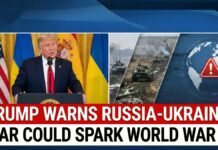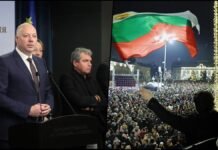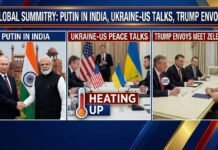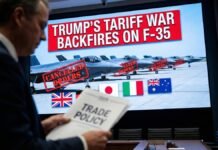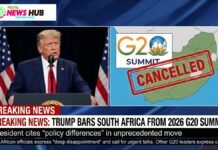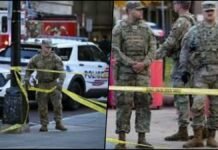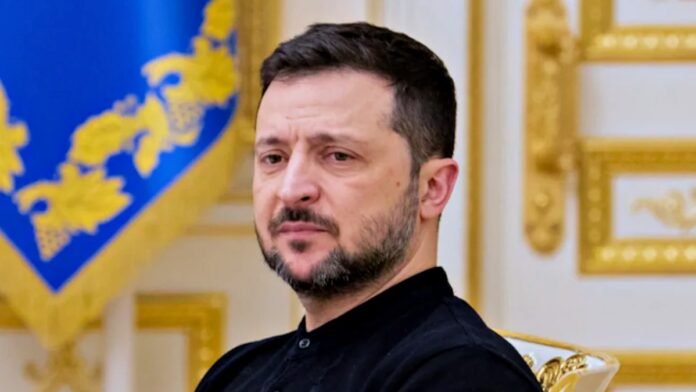
Key Points:
- Ukrainian President Volodymyr Zelensky has stated he is willing to resign if it guarantees Ukraine’s NATO membership and peace in the region.
- His remarks come on the eve of the third anniversary of Russia’s full-scale invasion of Ukraine.
- Russia launched its largest drone attack since the war began, firing 267 drones, with Ukrainian forces intercepting 138.
- Zelensky’s comments follow escalating tensions with U.S. President Donald Trump, who has criticized the Ukrainian leader and pushed for elections in Ukraine under martial law.
- NATO membership remains a contentious issue, with Russia strongly opposing Ukraine’s accession.
Kyiv: In a dramatic statement during a press conference in Kyiv on Sunday, Ukrainian President Volodymyr Zelensky declared his willingness to step down from office if it would secure Ukraine’s membership in NATO and bring peace to his war-torn nation. “If peace for Ukraine requires my resignation, I am ready. I would exchange it for NATO immediately,” Zelensky said, emphasizing that Ukraine’s security and sovereignty are his top priorities.
This announcement comes as Ukraine marks three years since Russia launched its full-scale invasion on February 24, 2022. Despite ongoing conflict and mounting casualties, Zelensky has consistently pushed for NATO membership as a critical step toward ensuring long-term peace and stability.
The Context: Escalating War and Political Tensions
Zelensky’s statement coincides with Russia launching its largest drone attack since the war began. On Saturday night, Moscow fired 267 drones at Ukrainian cities and infrastructure in what Ukrainian officials called an act of “aerial terror.” The Ukrainian Air Force successfully intercepted 138 drones, while another 119 were neutralized through electronic warfare. However, some drones caused damage in regions including Kyiv, Odesa, and Kryvyi Rih, where one civilian was killed.
The attack underscores the ongoing intensity of the conflict as both sides brace for another year of war. Meanwhile, Zelensky’s comments also reflect growing frustrations with Western allies. U.S. President Donald Trump recently labeled Zelensky a “dictator” and suggested holding elections in Ukraine despite martial law a proposal Zelensky dismissed as impractical.
Zelensky vs. Trump: A War of Words
Zelensky’s relationship with the U.S. has become increasingly strained under Trump’s administration. Trump has accused Ukraine of instigating the conflict and criticized Zelensky for lacking domestic support claims that have been widely disputed by independent polls showing strong public backing for the Ukrainian leader.
In response to Trump’s comments, Zelensky remarked that he is “not offended” but insisted on direct dialogue with the U.S. president before any negotiations involving Russian President Vladimir Putin. “I want more than mediation; we need clear security guarantees,” Zelensky said, reiterating his call for stronger Western support.
The Push for NATO Membership
Ukraine’s quest for NATO membership remains at the heart of its geopolitical strategy. Zelensky has argued that joining the alliance would deter further Russian aggression and provide critical security guarantees. However, NATO members remain divided on granting Ukraine membership due to fears of escalating tensions with Moscow.
Earlier this month, U.S. Secretary of Defense Pete Hegseth remarked that Ukraine’s accession to NATO was unlikely in the near term. In response, Zelensky warned that without NATO membership or equivalent security guarantees, Ukraine would need to significantly expand its military capabilities a costly and challenging prospect.
The Largest Drone Attack Yet
Saturday night’s drone assault marked a grim milestone in the war. According to Ukrainian officials:
- 267 drones were launched by Russian forces surpassing previous records.
- 138 drones were shot down by Ukrainian air defenses.
- Damage was reported in five regions, including Kyiv and Odesa.
- Three ballistic missiles were also fired during the attack.
Ukrainian President Zelensky condemned the strikes as “aerial terror” and called on international allies to hold Russia accountable. “Every day, our people stand against this terror,” he said in a social media post.
What Does Zelensky’s Offer Mean?
Zelensky’s offer to resign is seen as a bold move aimed at pressuring Western allies and NATO to take decisive action on Ukraine’s membership bid. While his resignation alone is unlikely to secure NATO accession given Russia’s staunch opposition it sends a strong message about his commitment to ending the war.
However, questions remain about whether such a step would truly lead to peace or merely create further instability in Ukraine’s political landscape. Analysts suggest that Zelensky’s resignation could leave a leadership vacuum at a critical juncture in the conflict.
As Ukraine enters its fourth year of war with Russia, the stakes have never been higher. With NATO membership still uncertain and Western support wavering under new political dynamics, Zelensky faces immense pressure to deliver both military victories and diplomatic breakthroughs.
His willingness to resign underscores his desperation to secure peace but also highlights the challenges of navigating complex global politics while defending his nation against relentless aggression. Whether this bold gambit will yield results remains to be seen as world leaders deliberate their next moves in one of modern history’s most consequential conflicts.





